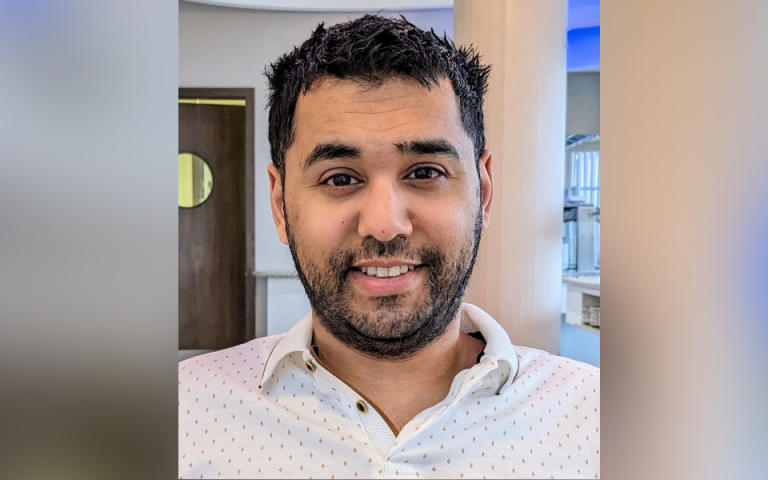Professor Vijay Chudasama
Professor Vijay Chudasama is a Professor of Organic Chemistry and Chemical Biology in the Department of Chemistry.

2 May 2023
When did you take up this position? What was your position beforehand?
I joined UCL as an undergraduate student in 2004 and I have pretty much been here ever since. In my undergraduate MSci project I worked on a novel, versatile approach for the synthesis of 2,4-substituted oxazoles under the tutelage of Dr Jon Wilden. Oxazoles are an important class of compounds that are present in various drug molecules of biological importance such as antivirals, antibacterials, antifungals, anti-inflammatories and antibiotics.
Following my undergraduate studies, I obtained my PhD in 2011 at UCL working with both Professor Stephen Caddick and Dr Richard Fitzmaurice on the use of air (instead of toxic/expensive metals or explosive peroxides) to selectively activate aldehyde C-H bonds for the construction of new C-C and C-N bonds.
After my graduate work, I took a year out of academia to work in patent law, before (with the encouragement and support of my wife) returning to UCL to do a postdoctoral stay in the laboratories of Professor Stephen Caddick and Dr Mark Smith where I turned my attention to developing novel reagents for site-selective protein modification using pyridazinediones (PDs).
In 2014, I was awarded a Ramsay Fellowship in the field of Chemical Biology and was made Technical Director of biologicals company ThioLogics, which is based on technology that I am a co-inventor of.
In early 2015, I was appointed to a lectureship at UCL and made my way to becoming a Professor of Organic Chemistry and Chemical Biology at UCL in 2019.
In 2021 I won the Royal Society of Chemistry’s Hickinbottom Award for developing techniques that can enable more targeted therapy, imaging and diagnostics for cancer. The Hickinbottom Prize is awarded for the most meritorious contributions to any area of Organic Chemistry made by an early career scientist.
Tell us about your work at UCL - how do you spend your days, and what makes your role different to similar positions elsewhere?
My work largely consists of teaching and research. I enjoy both aspects of the job, except for the associated admin parts(!).
In terms of teaching, I particularly enjoy interacting with keen students in the areas of Organic Chemistry and Chemical Biology – I like to encourage their enthusiasm and help them to achieve their full potential, wherever I can.
In terms of research, I love interacting with my research lab – I enjoy the environment of collaboration, exploring new ideas and trying to promote an environment that encourages innovation. More broadly, if I can, I just like to help people reach their potential - I think this is an important part of my job.
What are some of your favourite things about working at UCL? How have you found it different to previous jobs?
One of my favourite parts of UCL is the people. I have been here since I was 18 (as an undergraduate in Chemistry), and I have got to know many people in my Department – they are a fantastic group. This includes staff in various positions (academic, emeritus, professional support, technical, security, etc.). I have also enjoyed working with many talented under- and post-graduate students over the years.
Can you tell us about any upcoming research, or future projects that you're looking forward to working on?
I am particularly excited by our work on antibody modification with an eye on applications in imaging, therapy and diagnostics. We have developed many first-in-class strategies to site-selectively modify antibodies be it for dual click modification, controlled drug loading or (in our latest work) creating synthetic antibodies! This can be applied in the areas of cancer treatment, disease imaging, diagnostics and point-of-care lateral flow devices.
I mention "we" as a lot of this work has been carried out in collaboration with various academics across the UK, Europe and the USA, with a long-standing and fruitful collaboration with my colleague Professor James Baker (UCL) at the core. It is great to work and interact with Jamie on an almost daily basis.
Finally, tell us about your non-work life. Do you have any hobbies, or favourite places to go in London?
I enjoy going to theatres and museums in London. I have keen interest in economics, politics, finance and golf.
 Close
Close

